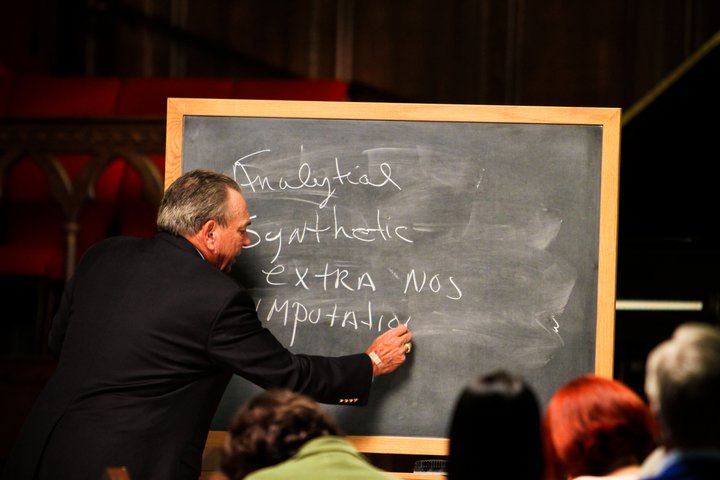Understanding the relationship between the new birth and saving faith is vital to an accurate understanding of our salvation. I believe the Bible teaches us clearly that regeneration (or the new birth) precedes (comes before) faith. In other words, while in a state of spiritual death, God makes His elect people spiritually alive (regenerating them); then they exercise faith, and then they are justified.
Regeneration >>>> Faith >>>> Justification
This is a logical sequence rather than a temporal one in that all this might take place in a split second in time, but logically, one thing has to come before the other. Dead people don’t do anything. God has to resurrect a person before he will ever take actions. That is true both physically and spiritually. Jesus did not ask for or need Lazarus’ cooperation in order to raise him from the dead. If He did, the miracle of resurrection would never have happened. But Jesus acted monergistically (one power working), for without any assistance, He spoke life into Lazarus’ dead physical body. Once brought back from the dead, Lazarus could then do something and took steps to exit the tomb.
Understanding this principle of monergistic (one power working) resurrection allows us to fully appreciate the Divine miracle of our spiritual resurrection. If you are a believer in Christ, God has done this for you.
Paul, writing to the Christians at Ephesus wrote, “You He made alive who were dead in trespasses and sins.” (Eph. 2:1) The word for “dead” here in Greek is necros, meaning “dead like a corpse.” The Christians were once dead, but are now alive. Of course, Paul is refering to spiritual rather than physical death. In this passage there is no mention whatsoever of the Christian’s role in this, for the simple reason that the dead cannot do anything either to cause or to facilitate resurrection. Resurrection is an act of God – something He does by Himself – alone.
Spiritually dead people are not physically, intellectually or emotionally dead, and therefore have an interest in all kinds of (non-spiritual) things. They may or may not have an interest in religion, and may even appear to be seeking after God and truth, while the fact is, they are running as fast as they can away from Him, seeking refuge from Him in false religion or false forms of spirituality, having no interest in a relationship with the One true God. They may want the benefits of what a relationship with God would bring (peace, guilt removed, feelings of belonging, etc.), which is why they appear on the surface to be seeking God. That is because the Christian knows that the only One who can give these benefits, ultimately is God Himself. However, though unregenerate man longs for the benefits of what only a relationship with God can bring, he wants these things in independence of Him.
We do not know this from outward observation but by the revealed truth of God’s word. Romans 3:11 says, “there is no one who seeks for God” – literally, “there is no God seeker.” Seeking is therefore the business of the believer and starts at the moment of regeneration, but not before.
Those who are in the flesh (those without the Spirit) cannot please God, will not submit to the law of God and indeed, are incapable of doing so (Rom. 8:7,8). Jesus made it clear that unless someone is first born again they cannot enter the kingdom of God (John 3).
A verse that spells this out in some detail for us is 1 John 5:1. “Everyone who believes that Jesus is the Christ has been born of God.”
In the original Greek, the verb tenses are very revealing. A literal translation reads: “All the ones going on believing (pisteuon, a present tense, continuous action) that Jesus is the Christ has been born (gennesanta, perfect tense – an action already complete with abiding effects) of God.”
The fact that someone is presently going on believing in Christ shows that they have first been born again. Faith is the evidence of regeneration, not the cause of it. Since both repentance and faith are possible only because of the work of God (regeneration), both are called the gift of God in scripture (Eph. 2:8, 9; Phil. 1:29; 2 Tim 2:24-26).
Here are two videos that walk us through the 1 John 5:1 text, the first by Dr. John Piper. Continue reading →

